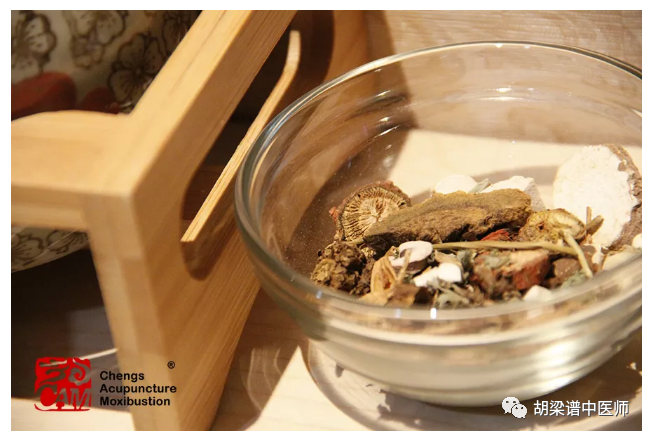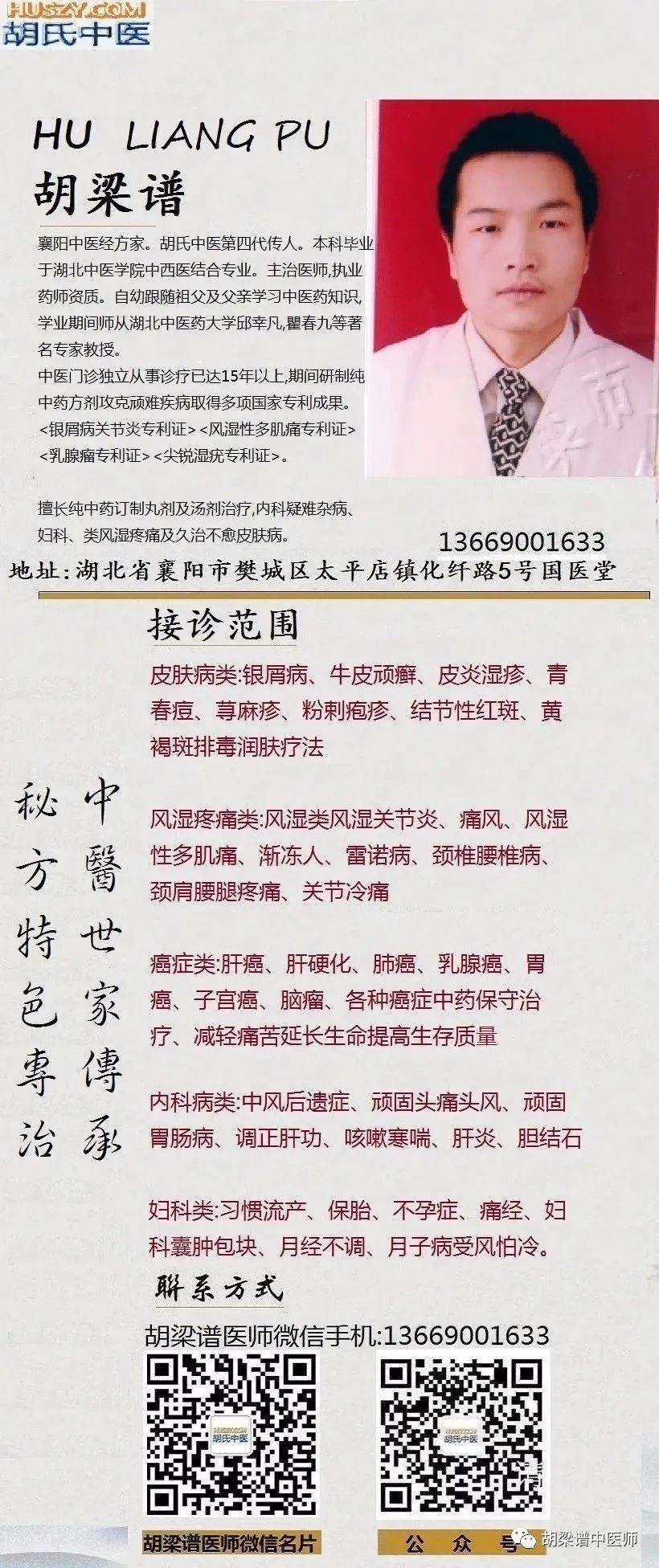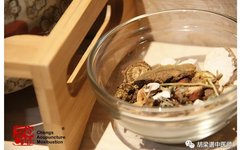In daily practice, I, Dr. Hu Liangpu, most frequently prescribe decoctions and pills for patients, while powders are currently used less often. Here, I will discuss the appropriate timing for using decoctions, powders, and pills.
In the texts of “Shang Han” and “Jin Kui”, we encounter the three forms: decoctions, powders, and pills. When reading “Shang Han” and “Jin Kui”, it is essential to know when to use decoctions, when to use powders, and when to use pills, as each has its specific application. The character for decoction (汤) has a radical for water, indicating its swift action. For example, if Gui Zhi Decoction (桂枝汤) were made into pills, it would not have the same effect; taking Gui Zhi Pills would not induce sweating for half a day. The preparation of decoctions requires skill; when you drink a decoction, you should absorb its essence and energy. What does this mean? When you want to disperse, you need to ensure that the pores of the body open up, which is best achieved by boiling the decoction vigorously. High heat extracts its energy, while low heat extracts its essence. When treating illnesses, speed is crucial; thus, decoctions are boiled vigorously. Therefore, all medicines that promote sweating should be boiled vigorously. If the method of preparing the decoction is incorrect, the efficacy will be diminished. When attacking the interior, one must focus on its essence, such as in the case of Da Cheng Qi Decoction (大承气汤), which aims to expel stool. If you focus on its energy, it will rise and not work effectively. You need to focus on its essence; Bai Hu Cheng Qi Decoction (白虎承气) should be simmered slowly to ensure it effectively clears the bowels. The purpose differs. Therefore, when we need to cleanse the five viscera and six bowels, we should use decoctions; when unblocking channels and collaterals, decoctions can also be used. When there is an imbalance of Yin and Yang, we also use decoctions. What does it mean to have an imbalance of Yin and Yang? This can be observed in many ways. For instance, feeling drowsy during the day but alert at night indicates an imbalance. When the pathogenic factor is severe, and the condition is critical, decoctions should be used. Additionally, when a patient is emaciated and their muscles are withered, decoctions can be used to nourish them. For poor skin conditions, decoctions can also help improve it quickly, and to tonify Qi and blood, decoctions can be used.
Powders, or medicinal powders, are used for chronic conditions affecting the limbs, such as rheumatism, where the disease wanders and is unpredictable. Sometimes, pills must be used; pills are primarily effective for breaking down accumulations, hard lumps, tumors, etc. If a person has a poor appetite and cannot eat, pills can be used to gradually stimulate the appetite, as pills have a slow and concentrated effect.

1. Timing for Using Decoctions
1. Decoctions should be used for external pathogenic diseases. For example, for external wind-cold, colds, and fever from COVID-19, decoctions should be used to dispel the cold. Based on the nature of the external pathogenic disease, it can be classified as wind-cold, wind-heat, warm disease, or warm epidemic disease. External pathogens enter the body from the outside and cause illness, so the treatment direction is to take decoctions internally, boiling them vigorously to extract their upward-moving energy, which the body can absorb to disperse the external pathogenic factors and viruses. Thus, the treatment direction of internal decoctions is to disperse from the inside out, contrary to the direction of the external pathogens entering the body, thereby alleviating the disease.
2. Decoctions should be used for imbalances of Yin and Yang. An imbalance of Yin and Yang in the body often presents typical symptoms of Yin-Yang disharmony. What does it mean to have an imbalance of Yin and Yang? This can be observed in many ways. For instance, feeling drowsy during the day but alert at night indicates an imbalance. When you feel different from others, it signifies an imbalance. For example, in classical formulas, Gui Zhi Decoction is used to harmonize the Ying and Wei Qi, which is a typical formula for Yin-Yang imbalance, characterized by fever, sweating, nasal congestion, aversion to wind, and cold, where Yang heat is floating outside, and Yin is weak and unable to contain the sweat. Gui Zhi Decoction is used to harmonize Yin and Yang. Similarly, Xiao Chai Hu Decoction (小柴胡汤) is also a typical formula for harmonizing Yin and Yang. When the symptoms of Xiao Chai Hu Decoction appear, the body alternates between feeling hot and cold, with symptoms of nausea, vomiting, and fullness in the hypochondrium, indicating an inability to harmonize Yin and Yang, thus requiring the use of decoctions like Xiao Chai Hu Decoction for harmonization.
3. Decoctions should be used for critical and severe conditions. In my clinical practice, I have treated some critical conditions. When a person’s vital energy is weak, decoctions, being liquid, are easy to swallow and can quickly enter the esophagus and digestive system. In such cases, only decoctions can be effective. For instance, I recently treated a 78-year-old man who suddenly could not open his mouth in the morning and could not get out of bed, with his jaw tightly closed. After using acupuncture to relieve the meridians and open his mouth, I administered a decoction. At this point, the patient might not be able to eat solid food, but decoctions, being liquid, have the property of moistening and moving downward in the body. Therefore, I used San Sheng Yin (三生饮) combined with Da Chai Hu Decoction to relieve his severe throat obstruction. If I had used pills, the medication would have likely gotten stuck in the throat or esophagus, which is not as rapid as decoctions. After the decoction took effect, I then used pills to consolidate the treatment, and he is now able to take care of himself.
4. Decoctions should be used for dry and withered muscles. Decoctions are water-based, and water is moistening and downward-moving. In the “Book of Documents” it states: “Water moistens and descends, fire ascends, wood bends and straightens, metal transforms, and earth is for farming.” When muscles are withered and dry, decoctions should be used to moisten them. In my clinic, I often see patients who are pale and emaciated. Dr. Hu Liangpu often uses Ba Zhen Decoction (八珍汤) to treat such patients with dry muscles, achieving excellent results.
5. Decoctions should be used for systemic diseases. Decoctions are cleansing agents. For example, when I see a patient whose body is afflicted from head to toe, with dizziness, headaches, a dull complexion, chest and abdominal fullness or pain, and foot pain, this indicates a systemic condition with widespread pathology, requiring decoctions to reach the entire body.
II: Timing for Using Powders
1. Powders should be used in special cases of critical conditions. Powders are extremely fine herbal powders. For example, if a person suddenly has a stroke and is unconscious, with a tightly closed jaw and rigidity throughout the body, in addition to immediate acupuncture for emergency treatment, we typically use some opening powders to treat them. These contain potent herbs like musk, borneol, soapberry, and fresh pinellia, made into a powder and blown into the patient’s nostrils for strong stimulation, allowing the Yin and Yang energies to flow smoothly and restore consciousness.
2. Powders should be used for chronic, unpredictable diseases. For example, if a person has pain or itching that sometimes manifests on the surface and sometimes goes deeper, indicating a chronic condition that is unpredictable, powders can be used. For instance, if a person has stomach pain that fluctuates, and the condition has persisted for a long time, we can use Wei Ling San (胃苓散) for treatment.
3. Examples of improper use of powders. The preservation and fineness of powders have strict standards. In my daily practice, I often encounter patients who bring powders prepared by other practitioners that are too coarse. After taking them, not only do they fail to alleviate stomach pain, but they also cause nausea and vomiting. If powders are made very finely, they are challenging to preserve; they absorb moisture and clump together when exposed to air, leading to many limitations. Due to these characteristics, I currently do not use powders for many patients but prefer to use pills for treatment.
III: Timing for Using Pills
1. Pills should be used for rheumatism and rheumatoid joint pain. Pills are slow-acting. According to the medical sage Zhang Zhongjing, rheumatism is a condition of wind and dampness. To dispel wind and dampness, it should be done gradually; if a strong method is used, the wind will leave, but the dampness will remain, and the disease will not be cured. I have formulated Hu’s Rheumatoid Pills to gradually decompose the rheumatoid lesions and eliminate the disease step by step for a true cure.
2. Pills should be used for lumps, tumors, and accumulations. Pills have the characteristic of concentrated action. When targeting a specific point, pills should be used. For example, the Gui Zhi Fu Ling Wan (桂枝伏苓丸) for treating gynecological tumors and the Bie Jia Jian Wan (鳖甲煎丸) for treating lumps under the ribs. In my practice, I primarily use pills to treat cancer and tumors.
3. Pills should be used for parasitic diseases. The Wu Mei Wan (乌梅丸) for treating ascariasis is a pill, as are the Fei Er Wan (肥儿丸) and Bu Dai Wan (布袋丸), which fully utilize the clinical characteristics of pills for treating parasites.
4. The unique advantages of pills compared to powders: In most cases where powders can be used, pills can also be used. Compared to powders, pills are easier to preserve and less likely to spoil or absorb moisture. Many people report issues when taking powders, such as the powder sticking in the throat, causing discomfort, or the coarse powder causing stomach pain. Currently, I have formulated pills that completely overcome these issues, ensuring they do not harm the stomach, do not stick in the throat, and are easy to swallow, absorb, and treat diseases effectively.
February 7, 2022, Dr. Hu Liangpu, Xianyang TCM Practitioner


